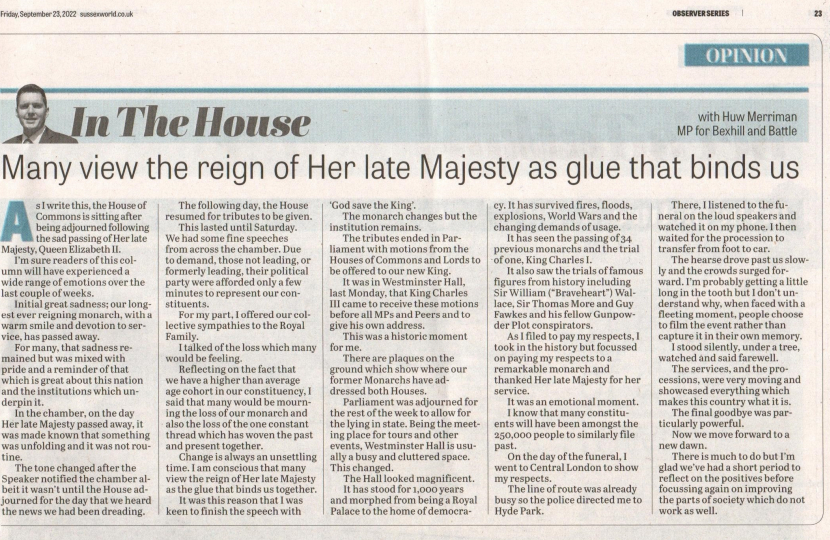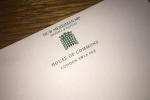
As I write this, the House of Commons is sitting after being adjourned following the sad passing of Her late Majesty, Queen Elizabeth II. I’m sure readers of this column will have experienced a wide range of emotions over the last couple of weeks. Initial great sadness; our longest ever reigning monarch, with a warm smile and devotion to service, has passed away. For many, that sadness remained but was mixed with pride and a reminder of that which is great about this nation and the institutions which underpin it.
In the chamber, on the day Her late Majesty passed away, it was made known that something was unfolding and it was not routine. The tone changed after the Speaker notified the chamber albeit it wasn’t until the House adjourned for the day that we heard the news we had been dreading.
The following day, the House resumed for tributes to be given. This lasted until Saturday. We had some fine speeches from across the chamber. Due to demand, those not leading, or formerly leading, their political party were afforded only a few minutes to represent our constituents. For my part, I offered our collective sympathies to the Royal Family. I talked of the loss which many would be feeling. Reflecting on the fact that we have a higher than average age cohort in our constituency, I said that many would be mourning the loss of our monarch and also the loss of the one constant thread which has woven the past and present together. Change is always an unsettling time. I am conscious that many view the reign of Her late Majesty as the glue that binds us together. It was this reason that I was keen to finish the speech with ‘God save the King’. The monarch changes but the institution remains.
The tributes ended in Parliament with motions from the Houses of Commons and Lords to be offered to our new King. It was in Westminster Hall, last Monday, that King Charles III came to receive these motions before all MPs and Peers and to give his own address. This was a historic moment for me. There are plaques on the ground which show where our former Monarchs have addressed both Houses.
Parliament was adjourned for the rest of the week to allow for the lying in state. Being the meeting place for tours and other events, Westminster Hall is usually a busy and cluttered space. This changed. The Hall looked magnificent. It has stood for 1,000 years and morphed from being a Royal Palace to the home of democracy. It has survived fires, floods, explosions, World Wars and the changing demands of usage. It has seen the passing of 34 previous monarchs and the trial of one, King Charles I. It also saw the trials of famous figures from history including Sir William (“Braveheart”) Wallace, Sir Thomas More and Guy Fawkes and his fellow Gunpowder Plot conspirators.
As I filed to pay my respects, I took in the history but focussed on paying my respects to a remarkable monarch and thanked Her late Majesty for her service. It was an emotional moment. I know that many constituents will have been amongst the 250,000 people to similarly file past.
On the day of the funeral, I went to Central London to show my respects. The line of route was already busy so the police directed me to Hyde Park. There, I listened to the funeral on the loud speakers and watched it on my phone. I then waited for the procession to transfer from foot to car. The hearse drove past us slowly and the crowds surged forward. I’m probably getting a little long in the tooth but I don’t understand why, when faced with a fleeting moment, people choose to film the event rather than caption it in their own memory. I stood silently, under a tree, watched and said farewell. The services, and the processions, were very moving and showcased everything which makes this country what it is. The final goodbye was particularly powerful.
Now we move forward to a new dawn. There is much to do but I’m glad we’ve had a short period to reflect on the positives before focussing again on improving the parts of society which do not work as well.



